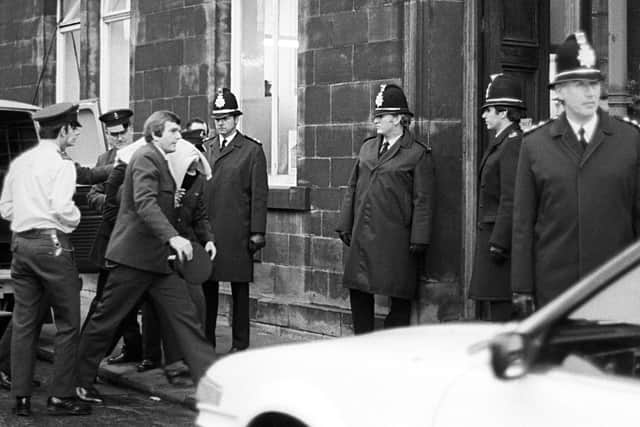How police's Peter Sutcliffe press conference led to tougher contempt of court laws - Richard Jones
The law tightly controls what the media can publish about a case once proceedings are considered ‘active’ – usually when a suspect has been arrested. This is to help make sure jury members aren’t swayed by pre-trial publicity.
Our system is much tougher than in other countries, such as the US. There, pre-trial media reporting is routine in cases from OJ Simpson to the recent Murdaugh family murders, discussed everywhere from breathless podcasts to in-depth TV documentaries.
Advertisement
Hide AdAdvertisement
Hide AdBut why the difference? In new research published in the academic journal Media History, I’ve established a connection to one of the most infamous episodes in Yorkshire’s recent past.


This story begins on a January evening in 1981. A crowd of journalists had packed into a small room at Dewsbury Police Station. They were told the five-and-a-half year hunt for Britain's most wanted man was over. A suspect was being questioned over the Yorkshire Ripper murders.
The Chief Constable of West Yorkshire Police, Ronald Gregory, grinning alongside two jubilant colleagues, said that he was “absolutely delighted with developments at this stage." He strongly implied the man in custody was the Ripper.
He was right. The man, Peter Sutcliffe, was indeed the serial killer. He had murdered 13 women and tried to kill at least seven more. But the triumphant way in which Gregory delivered the news and how that was reported by much of the media, especially national newspapers, went well beyond traditional crime coverage.
Advertisement
Hide AdAdvertisement
Hide AdSolicitor General Ian Percival described those conventions in a warning to the media later that week, reminding journalists of "the vital principle embodied in English law that a man accused of a crime, however serious, is presumed to be innocent and is entitled to a fair trial.”
The warning came too late. Dramatic coverage of the Ripper's arrest had spread across radio, TV and the front pages. Editors, egged on by the celebratory tone of Gregory’s news conference, felt on safe ground to strongly suggest the right man was in custody.
So many journalists went looking for stories about Sutcliffe’s past that residents of his birthplace of Bingley said the town had never seen as many men in suits during the day.
Yet it was not relieved readers, listeners and viewers who were the most significant audience. Rather, it was the small group of Parliamentarians already considering legislation that would finally put the UK's piecemeal practices around contempt into a statute.
Advertisement
Hide AdAdvertisement
Hide AdThe original Bill was more friendly to the media. It could have allowed for proceedings to be considered ‘active’ later, allowing more scope for news coverage that would serve to keep the public better informed. It also included plans to allow court reporters to make audio recordings in court.
Bolstered by outrage at the Sutcliffe reporting, furious lawyers in the House of Lords seized their chance to toughen the law. They insisted that reporting should stop as soon as an arrest was made and considered any form of court recording far too noisy and disruptive.
Interviewing jury members to find out more about their decisions was also out. This had briefly been allowed after a juror in the trial of former Liberal leader Jeremy Thorpe explained their reasons for acquitting him in a magazine article, but would soon be against the law.
The Contempt of Court Act 1981 has, ever since, been a daily part of the life of British journalists.
Advertisement
Hide AdAdvertisement
Hide AdIt was hardly surprising that relieved police officers and competitive journalists alike would behave as they did in the immediate aftermath of the end of the largest manhunt in British criminal history.
It was an unfortunate coincidence for the media that Sutcliffe was arrested during the early stages of Parliament’s consideration of what would become the 1981 Act. A year earlier and the excesses of the initial reporting would have faded from memory, potentially allowing more concessions to media interests. A year later and a less restrictive version of the Act would have been safely on the statute book.
Before Sutcliffe’s arrest, there had been signals the Act would be more open to the media. Afterwards, the coverage of Sutcliffe would be an ever-present feature in Parliamentary discussions and not to the media’s advantage.
The restrictions included in the 1981 Act have made our justice system less open than it might otherwise have been. We know less about what the police are doing, how court cases are conducted and even about why juries come to their decisions, than in other countries.
Advertisement
Hide AdAdvertisement
Hide AdParliament has never re-examined this issue in the decades since. This has remained the case even in the different media landscape created by online media and social platforms. There, thousands unwittingly commit contempt every day by commenting on high-profile cases, a double standard when compared to the output of traditional media companies.
If our open system of justice is to not only keep up with the reality of technology, but also be as ‘open’ as it should be, it’s time to look again.
Richard Jones is Subject Area Leader for Media, Journalism, Film and Drama at the University of Huddersfield